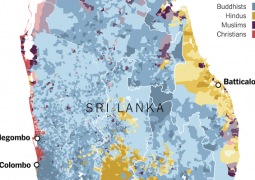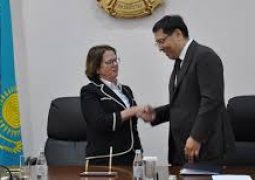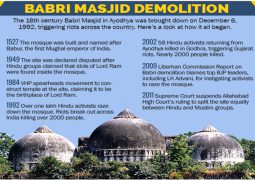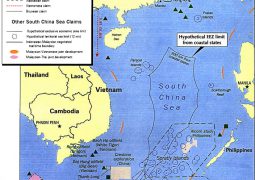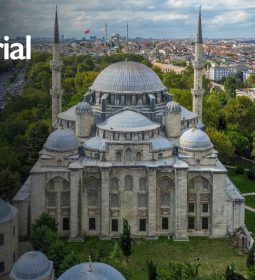Joy in Jordan as Amman reclaims enclaves formerly annexed by Israel
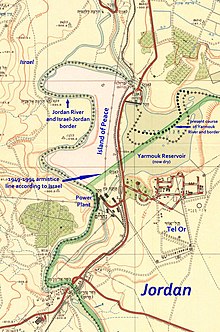
National flag raised in Baqoura and Ghumar after 25-year-old lease of lands as part of peace agreement expires
Mokhammed Ersan
in Amman, Jordan
A group of armed Jordanian soldiers stand next to a huge cement gate adorned with the image of King Abdullah II and the late King Hussein. The gate, located in the Baqoura area of northern Jordan near the border with Israel, was closed for the last time on Sunday, as Jordan-based public broadcaster al-Mamlaka shared scenes of the Jordanian flag being raised there.
Jordanians anxious for return of lands leased to Israel
Similar scenes took place on a strip of land in Ghumar, 400km south of the capital Amman, which lies near the old Dead Sea road, inside Jordanian territory.
King Abdullah II, Crown Prince Hussein and General Yousef al-Hunaiti, commander of the Jordanian army, entered Baqoura on Monday and performed noon prayers in the area.
The ceremonies mark Jordan officially taking back two stretches of land it had allowed Israel to use for decades, amid tense relations between the neighbours 25 years after they signed a landmark peace deal.
Both pieces of land are fertile farming areas with rich aquifer water supplies.
Under the terms of the 1994 Jordan-Israel peace treaty, the enclaves of Baqoura – which had been occupied by Israel since 1950 – and Ghumar – occupied following the 1967 war – would remain under Jordanian sovereignty while Israeli farmers maintained access to the land.
However, in 2018, as public pressure not to renew the arrangement relating to the two areas grew, Jordan’s King Abdullah II submitted a one-year notice of termination to Israel.
Jordan’s Foreign Minister Ayman Safadi said that Jordan has exercised its legal rights stipulated in the peace agreement by reclaiming the lands and that it respects Israel’s property rights.
Safadi also said that during the consultations over the arrangement, Amman had offered to sell the Baqoura area but Israel had refused.
Before Sunday, the gate in Baqoura had been used by Israeli farmers to enter the almost 1500 acre strip of land known in Israel as the “island of peace”.
But now, the Israeli farmers are no longer welcome.
“As of yesterday, anyone who wants to enter Baqoura and Ghumar must obtain a visa and enter through the border crossings,” Safadi stated.
King Abdullah and Crown prince Hussein pray in Baqoura, Jordan. (Jordanian Royal Court
Jordanian jubilation
“I will go with my family on a picnic and we will barbeque meat in Baqoura,” Ibrahim Najjar, a taxi driver, told MEE.
Despite Najjar’s spontaneous reaction to the news and his wish to visit, the specific area is still a closed military zone that no one can reach without a special security permission from the Jordanian army.
Khalil Attiyeh, a member of the Jordanian parliament, told MEE that he felt Jordan’s taking back of the areas was a “great victory”.
Attiyeh said it was an “overwhelming feeling of happiness to reclaim our fertile land and I feel like a piece of my body has returned to me as the land has returned to its owners”.
“The entire Jordanian people wanted to reclaim the land and now happiness has entered every Jordanian home. I salute King Abdullah II, who refused to renew the land usage agreement,” he added.
For 69 years, no Jordanian foot had set foot in Baqoura and Ghumar.
Shortly after the reclaiming of the land, a Jordanian tourism company called Dallas said on its Facebook page that it would organise trips to the areas.
Amjad Maslamani, a former member of the Jordanian parliament and the owner of Dallas, said that he planned to initiate “a touristic route to Ghumra and Baqoura and to the northern Jordanian rural areas”.
“Dallas will begin a comprehensive touristic route for Jordanians and foreigners to introduce them to areas that were reclaimed from the occupation,” he said.
‘Israel regrets Jordan’s decision’
At the same time the flag was raised in Baqoura on Sunday, King Abdullah II announced during the opening of the fourth regular session of the 18th parliament in Amman that Jordan “will apply its full sovereignty on every inch of the lands of Baqoura and Ghumar”.
The annexes to the 1994 treaty had guaranteed “private property rights and interests for Israelis and allows Israel to use the land”.
According to the treaty, Annex 1B was valid for 25 years and could be renewed for an equal amount of time unless either side decided to end it one year before its expiration.
Jordan calls on Israel to return leased lands after widespread political pressure
This is exactly what the Jordanian government did on 12 October last year.
Israel says that Jordan has agreed to allow Israeli farmers to continue cultivating the area until 30 April, which is when the current crop is due to be harvested.
The Israeli foreign ministry reacted in a statement on Sunday, using both the Israeli and Arabic names for the area: “Today, November 10th 2019, the two annexes to the peace treaty between Israel and Jordan, that established the special regimes in Naharayim/Baqoura and Tzofar/al-Ghumar will expire and Jordanian law will apply in full.
“Israel regrets Jordan’s decision to terminate the annexes. The Government of Jordan will continue to respect private ownership rights in Naharayim,” the statement continued. “Regarding Tzofar, the government of Jordan will allow Israeli farmers to harvest the crops that were planted before the annex expired.”
Jordan’s foreign ministry did not deny that permission had been given to Israeli farmers within strict conditions, but insisted that there had been “no extension or renewal of the two annexes in the Jordan-Israeli peace treaty”.
A press statement credited to a source in the foreign ministry said that “Jordan has carried out its legal right as stipulated in the treaty by not renewing the two annexes and continues to respect any private rights in Baqoura by allowing farmers to harvest what they have planted before the end of the annex in Ghumar in accordance to Jordanian law”.
“As to Baqoura, the peace treaty recognized that 820 dunams (202 acres) are privately owned and that Jordan will allow any Israeli citizen who can prove his ownership of private land to obtain a visa from the Jordanian embassy in Tel Aviv to enter the kingdom by way of the proper border crossing points and Jordan will respect this private ownership based on Jordanian law,” the source said.
Private ownership
The issue of private Israeli ownership of some of the land still poses questions for Jordan.
The story of these plots of land goes back to 1926, when the British Mandatory government gave a concession to the Palestinian Electricity Company, which was owned by Pinhas Rotenberg, one of the leaders of the Zionist movement.
The concession allowed his company to generate electricity by concerting the waters of the Jordan and Yarmouk rivers.
Later, Rotenberg sold his land to the Jewish Agency, an international body created in 1929 to assist and encourage Jews worldwide to help develop and settle Israel.
Anis Kassim, an expert in international law, tells Middle East Eye that “the Jordanian government needs to make sure that those properties were acquired in a legal and legitimate manner based on Jordanian law”.
“If the land is proved to have been acquired legally and legitimately, the Israeli will be dealt with in the same manner as any foreign investor,” he said. “The private land might be the right of the Israeli and they can benefit from it.
“But they can’t claim Israeli sovereignty on the farm or land which will now fall under Jordanian sovereignty, and like any other foreigner who buys land or a farm in Jordan, the applicable law will be Jordanian law irrespective of the citizenship.”
According to Kassim, “it is possible for an Israeli to own property in Jordan, according to the peace treaty, because the boycott law was cancelled and Israelis have the same rights to own in Jordan as Jordanians have a right in Israel”.
- Previous The King’s Chinese: how Penang’s ‘Grand Old Man’ Yeap Chor Ee went from penniless barber to one of Asia’s richest men
- Next Israeli farmers sweat as land they worked for decades to be given back to Jordan



